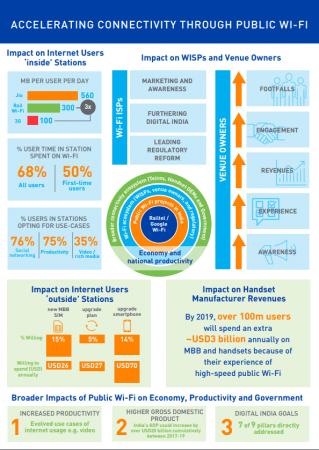India is already on the map for being one of the foremost countries in highest data consumption. But there are challenges that must be addressed in order to fully achieve the Digital India vision, and even though providing free Wi-Fi in public spaces might seem like a tough task, it serves a legit purpose.
Internet search titan, Google has major plans for India's public Wi-Fi, where the company plans to take the Wi-Fi service, called "Station" beyond railways and into malls, cafés and universities. After connecting 400 railway stations in partnership with RailTel, Google is reportedly in talks with stakeholders, telcos, ISPs and state governments to further expand access to public Wi-Fi.
According to Analysys Mason report, public Wi-Fi could connect 40 million new users to the internet in the next year, which will, in turn, benefit a lot of sectors, improving India's GDP.
The report estimates public Wi-Fi could contribute $20 billion to India's GDP between 2017 and 2019, and at least $10 billion per annum thereafter.

Here's what David Abecassis, a partner at Analysys Mason, said in a statement.
Google and RailWire project to deploy high speed WiFi across 400 stations has shown that there was a technical and operational solution to providing high-quality public Wi-Fi to millions of Indians nationwide, on affordable terms. The success of this rollout and Reliance Jio's 80,000 public Wi-Fi access points as of mid-2017 provide valuable insights in further developing public Wi-Fi as a service that can truly achieve the Digital India vision.
As a result of this expansion, nearly 100 million people are estimated to spend an additional $2-3 billion per year on handsets and spend almost equally on mobile broadband services. This move will also benefit telcos, which can offload excess data traffic from cellular networks and decongest the networks for better mobile connectivity.

"This is just the beginning of a journey that will change India's access story and the Analysys Mason Report outlines some very important insights that can enable ISPs and TSPs to think in this direction. Together we have a lot of work to do to improve access and connectivity in the country," K. Suri, Director, Partnership, India, Next Billion Users, Google India, said in a statement.
According to ET Telecom, Google isn't looking to monetise its public Wi-Fi approach as "people aren't really willing to pay for the public WiFi services," Suri was quoted as saying. But he also added that if data is priced at Rs 5-6 per GB, users might consider paying for the public Wi-Fi service.
Telcos have also been acting independently to contribute towards public Wi-Fi. Airtel and Vodafone have already launched Wi-Fi hotspots and Reliance Jio is vital in the large-scale deployment. Telcos could also use this to offer voice over Wi-Fi (VoWiFi) in order to provide calling services in even remote areas that do not have cellular network.

















